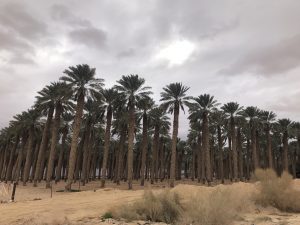By Cindy Baur
In my senior honors Anthropology thesis I critically analyze the local food movement in Carlisle, Pennsylvania and the surrounding area. My interest in the topic began during my sophomore year after taking a course called Nutritional Anthropology. My understanding of the local food movement developed further as I worked as a student farm worker at the Dickinson Farm during my sophomore year and continued while I participated in a food studies program in Perugia, Italy during my junior year.
I use my own ethnographic work, such as interviews with farmers, observations of Farmers on the Square board meetings, and participant observation at the farmers’ market, to understand the motivations of participating producers and consumers in Central Pennsylvania. I argue that the local food movement is a response to a global, industrialized neoliberal food system. Consumers seek out a more personal alternative to anonymous industrially produced food by responding to a call to “vote” with their dollars. However, they are unsuccessful because they are acting within their individual capitalist identities. In addition, not all consumers have an equal opportunity to “vote” and the rhetoric often ignores certain components of food production, such as labor, adding to the elitism of the movement.
After graduation I submitted a shortened version of my thesis to be considered for the Christine Wilson Award, offered by the Society for the Anthropology of Food and Nutrition. My thesis won the undergraduate prize for outstanding undergraduate research on nutrition, food studies and anthropology. In November I will attend the American Anthropological Association annual conference in Minneapolis, MN to accept the award in person.
Below is the introduction to Cindy’s thesis paper. If you would like to read more or discuss Cindy’s research, please contact baurc@dickinson.edu:
Every Wednesday all summer long the cement square in front of the First Presbyterian Church, located at the center of Carlisle, Pennsylvania, transforms into a bustling marketplace called Farmers on the Square (FOTS). The square becomes full of tents, shoppers, children, and dogs. Each unique tent houses colorful vegetables, fruits, flowers, and coolers full of chilled chicken, sausages, and other meat. The air smells of roasting garlic and burning wood, thanks to the Dickinson Farm’s pizza oven. Children run around on the lawn in front of the church, while their parents, who are often treated much more like friends, ask questions about the recent bout of rain they know flooded their farmers’ fields. Families return home, overstuffed market totes in hand, anxiously awaiting the bounty of the next week’s market. As a loyal supporter of FOTS, I delved into the market trying to understand first-hand how the local food movement plays out in a familiar context.
In this paper I will engage with existing literature about the local food movement in order to analyze how this alternative food movement functions within the context of Central Pennsylvania. First, I will describe the history of FOTS and other farmers’ markets that have existed in the area to provide historical context to the local food movement. Then, I will discuss the agrarian ideals we hold in the US and how those ideals influence Central Pennsylvania. I then interrogate the many interpretations of “local” including anthropologists’ use of terroir within the local food movement. In a similar vein, I apply the concept of terroir to this specific geographic region. Next, I describe the global, industrial food system, the local food movement, and neoliberalism. I argue that the local food movement is a response to a neoliberal economic system in which consumers demand an alternative market that is socially embedded, environmentally sound, and socially just. However, I believe that the local food movement is not
successful at meeting these goals because it simultaneously recreates and works within the neoliberal structures to which it is reacting. Like neoliberal policies, alternative food movements rely on individual actors to create change through their capitalist identities, such as “voting” with their dollars. However, this exacerbates inequalities and perpetuates and aura of exclusivity since not all consumers have equal opportunities to “vote.” Finally, I conclude that while the local food movement may not be successful at provoking change on its own, it is still an important and valuable tool for making change.


